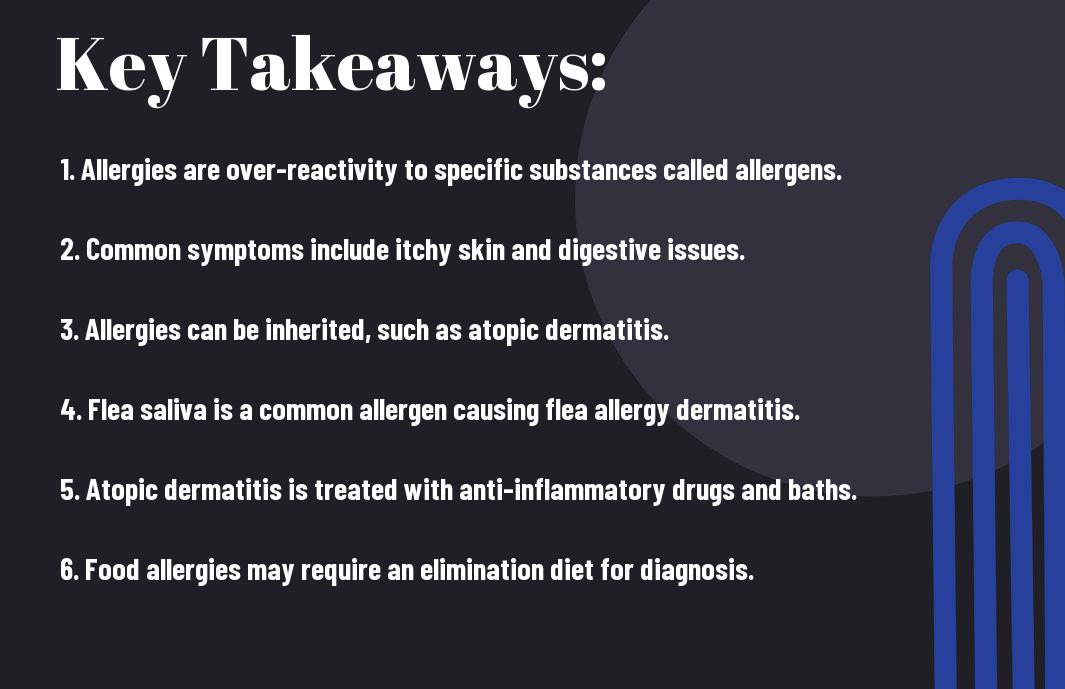Overreactivity to certain substances can cause allergies in dogs, leading to discomfort and health issues. Understanding the causes, symptoms, and treatment options for your furry companion is crucial in providing the best care possible. From flea allergies to food sensitivities, these allergies can be complex and challenging to manage. In this informative blog post, we will probe into the different types of allergies that can affect dogs, common allergens, and expert advice on diagnosis and treatment from experienced veterinarians. Stay informed and empowered to help your dog live a happy, itch-free life!
Key Takeaways:
- Allergy Definition: An allergy in dogs is an over-reactivity of the immune system to allergens, most commonly proteins from plants, insects, animals, or foods.
- Symptoms: Common symptoms of allergies in dogs include itchy skin and digestive issues like vomiting and diarrhea.
- Treatment Options: Treatment for allergies in dogs can involve anti-inflammatory therapy, shampoo therapy, hyposensitization, nutritional therapy, and elimination diets for food allergies.
Understanding Canine Allergies
A dog’s allergies can be a source of discomfort and concern for pet owners. To help you better understand and manage your canine companion’s allergies, check out some expert tips on Seasonal Allergies: 5 Expert Tips to Help Your Canine…
The Science of Allergies in Dogs
Science plays a crucial role in understanding canine allergies. Allergies in dogs occur when the immune system overreacts to a substance known as an allergen. This hypersensitivity can lead to a range of symptoms, from itchy skin to digestive issues.
Common Types of Allergies
With allergies being quite common in dogs, it’s necessary to recognize the different types that can affect your furry friend. Here are some common types of allergies seen in dogs:
| Inhaled Allergies | Skin Contact Allergies |
| Food Allergies | Flea or Insect Bite Allergies |
| Contact Allergies | Atopic Dermatitis (Atopy) |
- After identifying the type of allergy, appropriate treatment can be administered by your veterinarian.
Identifying Allergies in Your Dog
Symptoms and Diagnosis
Assuming your dog is exhibiting symptoms such as itchy skin, vomiting, or diarrhea, it is important to consider the possibility of allergies. Most allergies in dogs manifest as itchy skin, either localized or generalized. To accurately diagnose allergies in your dog, a thorough examination by a veterinarian is crucial. Your vet may recommend tests to identify the specific allergen causing the reaction.
The Role of Allergy Testing
To pinpoint the exact allergen triggering your dog’s symptoms, allergy testing plays a crucial role. Testing methods such as intradermal skin tests or blood tests can help identify the specific allergens affecting your dog. This information is imperative in developing an effective treatment plan to manage your dog’s allergies and improve their quality of life.
Understanding the specific allergens that affect your dog is key in providing targeted treatment and relief. Allergies can be a significant source of discomfort for your furry friend, but with proper diagnosis and management, you can help alleviate their symptoms and ensure their well-being.
Management and Treatment Options
Medical Interventions
The key to managing your dog’s allergies lies in understanding the triggers and implementing appropriate treatment. Medical interventions, such as anti-inflammatory drugs like corticosteroids or antihistamines, can effectively block allergic reactions. In severe cases, newer medications like oclacitinib (Apoquel®) or lokivetmab (Cytopoint®) may provide relief. Additionally, bathing with hypoallergenic shampoos and controlling fleas can help alleviate symptoms.
At-Home Care and Prevention
At-home care and prevention play a crucial role in managing your dog’s allergies and improving their quality of life. Options such as regular bathing with hypoallergenic shampoos, maintaining strict flea control, and using specific diets formulated to reduce itching can significantly benefit your furry friend. For instance, feeding your dog a veterinary hypoallergenic diet for an extended period can help identify and eliminate food allergens, leading to symptom improvement.
Nutrition and Allergies
The Impact of Diet on Allergies
After diagnosing your dog with allergies, it is crucial to consider their diet to manage and alleviate symptoms. Food allergies in dogs can develop at any age and commonly involve proteins such as beef, chicken, lamb, eggs, dairy products, and soy. It is important to identify the offending components of the diet and eliminate them to effectively treat food allergies.
Hypoallergenic Diet Plans
To address food allergies in dogs, hypoallergenic diet plans are often recommended. These diets are formulated to reduce itching caused by atopic dermatitis and improve skin health by eliminating common allergens. When conducting an elimination diet trial using a veterinary hypoallergenic diet, it is crucial to feed the special diet exclusively for at least eight weeks to see significant improvements in clinical signs.
To wrap up
Presently, understanding and managing your dog’s allergies is crucial for their overall well-being. Allergies in dogs, whether they be flea allergies, food allergies, or contact allergies, can have a significant impact on their quality of life. Identifying the allergen, whether through testing or elimination diets, is key to providing effective treatment. From anti-inflammatory therapy to hyposensitization therapy, there are various options available to help alleviate your dog’s allergic symptoms. By working closely with your veterinarian and following their advice diligently, you can help your furry companion find relief from itching, inflammation, and discomfort caused by allergies. Recall, a healthy and happy dog starts with proper allergy management.
FAQ
Q: What is an allergy in dogs?
A: An allergy in dogs is an over-reactivity or hypersensitivity of the immune system to a particular substance called an allergen, which can be proteins from plants, insects, animals, or foods.
Q: What are the common symptoms of allergies in dogs?
A: The most common symptom of allergies in dogs is itchy skin, which can be either localized in one area or generalized all over the body. In some cases, allergies can also manifest as digestive issues like vomiting and diarrhea.
Q: How common are allergies in dogs?
A: Allergies are quite common in dogs of all breeds and backgrounds, with most allergies appearing after six months of age, and most affected dogs being over one or two years old.
Q: Can allergies in dogs be inherited?
A: Some allergies, such as atopic dermatitis (atopy) or environmental allergies, are thought to be inherited. These allergies can be passed down genetically among certain breeds or lines of dogs.
Q: How are flea allergies in dogs treated?
A: Flea allergies in dogs, known as flea allergy dermatitis (FAD), can be treated by ensuring strict flea control measures, such as using modern monthly flea preventives. Additionally, antihistamines or corticosteroids may be prescribed by veterinarians to alleviate the allergic reactions.




